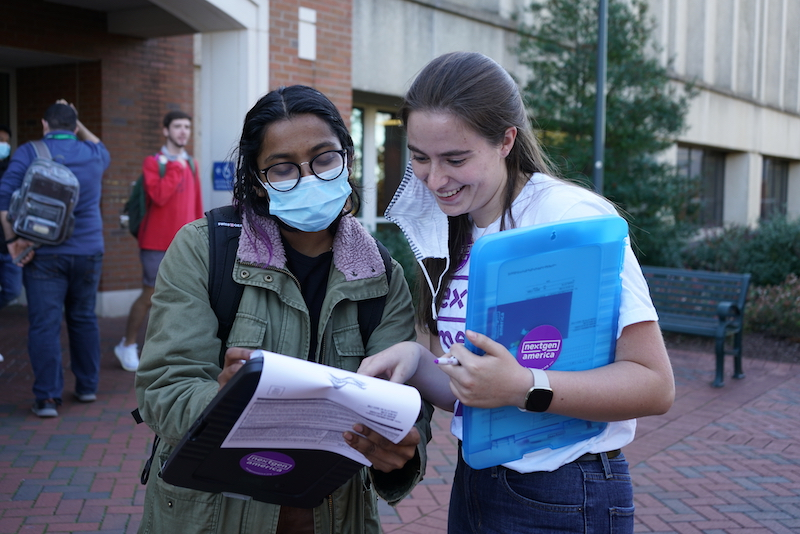Mobilizing young Southern voters for the midterms

Ahead of the November elections, voting rights groups are preparing to launch massive voter registration and mobilization efforts. One of those groups, NextGen America, a progressive youth advocacy organization, has already launched outreach efforts to connect with 9.6 million young voters in eight states, including North Carolina and Texas. (Photo courtesy of NextGen North Carolina.)
Across the South and country, efforts are underway to mobilize young people to vote in this year's midterms by building on their unprecedented engagement in the last presidential election.
In 2020, turnout among voters ages 18 to 29 increased by around 8 percentage points over 2016, with half of all eligible voters younger than 30 casting ballots, according to a study by the Center for Information and Research on Civic Learning and Engagement (CIRCLE), a Tufts University institute that studies younger voters. CIRCLE's analysis found that young voters gave a critical edge to Democrats in several key battleground states including Georgia, where Joe Biden defeated Donald Trump by fewer than 12,000 votes.
"Young people likely voted at one of the highest rates in decades, cementing their place as a pivotal part of the electorate, capable of shaping national priorities on issues like the pandemic, the environment, and racial justice," said CIRCLE Director Kei Kawashima-Ginsberg.
The trend of increased engagement among young voters can also be seen in recent midterm elections in Southern states. In 2018, for example, Georgia saw a 20 percentage-point increase in young voter participation over the 2014 midterms, while Texas tripled its 2014 young voter turnout rate of 8.2%. Voting rights advocates credit the growth in turnout to years of grassroots organizing and efforts to combat voter suppression.
Among the vote-suppressing tactics that Republican-controlled legislatures have used to target young voters are strict voter identification laws, voter registration restrictions, and closures of campus polling places. Indeed, researchers have found a strong correlation between higher youth turnout and policies that make voting and registration easier, such as automatic registration, same-day registration, early voting, and no-excuse absentee voting: Youth voter turnout in states with four or more of these policies in place was 54%, compared to 43% in states with only one to three of these policies. Youth turnout is generally lower in Southern states, which are less likely to have such provisions on the books.
"All of the things we see that make it more difficult to vote early, or vote by mail, they affect a number of different communities, but students are very much up there on that list," said Bob Brandon, president and CEO of the Fair Elections Center, which recently released a study on barriers to youth voting.
Roe ruling a motivator
This election year, NextGen America — a youth-focused progressive advocacy group launched in 2013 by liberal billionaire hedge fund manager Tom Steyer — is leading a campaign to mobilize voters ages 18 to 35. The effort aims to connect with 9.6 million young voters in eight states, including North Carolina and Texas in the South.
Earlier this year, NextGen organizers and volunteers in North Carolina text banked, phone banked, and hosted voter-registration events on college campuses, including the University of North Carolina at Chapel Hill. Between March and mid-May alone, the organization contacted more than 1.6 million young North Carolinians, and it's planning to intensify its efforts leading up to November.
"We are proud of the work we've done so far — but we're not stopping here," NextGen America North Carolina State Director Erik Daniels said in a statement. "We're ready to continue creating a state that truly represents the values of young people by turning out in record numbers."
In February alone, NextGen contacted more than 2 million young Texans through texts, calls and in-person contacts. Organizers and volunteers in the Lone Star State also hosted voter-registration booths on college campuses, including at the University of Texas at Austin, Texas Tech, Texas State, Texas Southern, and Tarrant County Community College. In all, the group contacted young people in all 254 Texas counties and 2,273 ZIP codes, according to organizers.
"By connecting with millions of young voters, NextGen is laying the groundwork for youth participation in 2022, and all future Texas elections," NextGen America President Cristina Tzintzún Ramirez said.
Young people already showed higher levels of concern than their older counterparts about climate change, LGBTQ rights, gender equity, gun control, and racial justice — and then came the U.S. Supreme Court's attack on the constitutional right to an abortion. A recent CBS/YouGov poll found that 68% of Americans ages 18 to 29 disapprove of Roe v. Wade being overturned, while 78% support abortion being legal in all or most cases. Meanwhile, recent polling by CIRCLE found that 41% of youth — the highest of any age group — said the decision makes them more likely to vote in 2022.
"The millions of young people that NextGen mobilizes are ready to fight back and stop the erosion on other basic rights from access to contraceptives, gay marriage, and even our basic right to vote," said Tzintzún Ramirez.
Tags
Benjamin Barber
Benjamin Barber is the democracy program coordinator at the Institute for Southern Studies.
